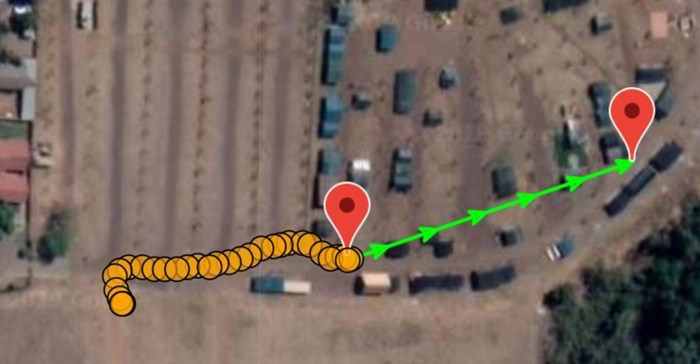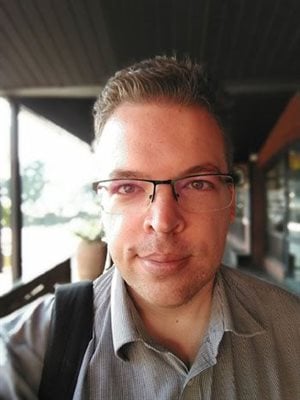
Whether you’re coordinating travel plans deep into the bushveld, beaches or even simply in South Africa’s urban jungles, OverHere’s mapcodes will allow you to find your way with minimal fuss.
The latest upgrade of OverHere adds walking directions alongside driving directions, and has previously enabled voters to find remote polling stations in May, attracted attention at industry conferences, helped ensure that deliveries to mines run smoothly, and given all its diverse visitors an alternative to sharing their location accurately.
We chat to Schnell to find out more...
From 2016 to 2017 I worked for TomTom South Africa as the company’s B2B marketing manager (promoting map licensing to corporate clients and government), which is where I was first exposed to open source mapcodes – the underlying address-shortening system utilised by OverHere.
Although I immediately saw the value of mapcodes, I felt a lot more could (and should) be done within a South African context to increase public awareness and uptake of this incredible technology (if you don’t know what it is, don’t worry – most people don’t… yet).
Two years later, over my December 2018 holiday, I set myself a personal goal to see if I could use what I knew about web development and JavaScript to create a functioning website that enabled users to generate and decode mapcodes. I achieved that goal, and in January 2019 I officially launched OverHere and have never stopped working on it in my free time since (I’ve got a full-time job so I describe what I do as a hobby that will improve more lives than just my own).

The two trends with addresses these days are: "I’ll just put wherever I’m going into Google and I’ll find it" or, failing that, we ask somebody to send us a location pin via WhatsApp. However, that tends to only work in big cities, and more often than not you still end up driving to the wrong Point Of Interest (POI), or one which isn’t near a convenient entrance (e.g. a POI that lies over the middle of a massive shopping centre and not the entrance to the public parking which you actually want), or is long and complicated to type in (spelling is a major issue in a country with 11 official languages).
When you leave the urban jungle you can forget about that entirely: street names in remote areas aren’t captured or are non-existent, shops aren’t loaded or updated, and you can forget about finding anything outside of small towns unless you know the area (or type in GPS coordinates by hand).
A final major concern comes down to everyday useability: your business card isn’t big enough for your full physical address, and you can’t write down that location pin by hand inside your trusty phonebook or share it telephonically. Mapcodes address all of the above (no pun intended): they’re short (generally not more than six characters excluding the ZAF country code for South Africa), can be easily written down or shared verbally (alphanumeric characters only), are language-agnostic and – best of all – they’re completely free to use and accurate to within around five meters.
By promoting mapcodes in South Africa, OverHere is already unique (no other local website provides what it does), and even at an international level it stands out: the Netherlands-based Mapcode Foundation lists OverHere as a recommended website.
Over the course of 2019, I’ve invested a lot of effort into continually refining and streamlining the website’s user experience, preparing it for users who won’t even know what mapcodes are before they arrive. The key focus now has been mobile optimisation and simple user journeys for every possible action where key decisions are made in a linear fashion and with easy-to-understand phrases. By integrating with Google Maps and Waze for directions, OverHere doesn’t try to recreate the wheel: rather we offer people an enhanced form of addressing that plugs directly into navigation systems they’re already comfortable with.
If you explain what you’re doing to a friend and are met with a blank expression, you have to go back and simplify your idea further – no matter how much time it took to build it like it was, or how 'cool' it is, people need to be able to have that ‘aha’ moment in five seconds flat after arriving or they’re going to leave.
Creating absolutely everything on OverHere by myself, from the front-end of the website to the back-end, and all the copywriting (along with social media and public relations on the side).
Along the way, I’ve had to refresh what I’d learned previously from only one year of Computer Science at University and dabbled with casually since, teaching myself JavaScript, HTML and CSS web development in a WordPress environment. Is it perfect? No, not by a long shot. Is it miles better than it was? Yes... and that’s all that matters; every time I get my hands dirty trying to bring the next idea into reality.
In July this year, I was particularly honoured by being selected for a speaker slot at the SA GeoTech conference, where I presented my website and mapcodes to industry professionals.
Getting enough technical skills into my head at the right time to cobble together a workable solution for end-users is an ongoing challenge. Because OverHere is a personal passion project, I don’t have the luxury of farming tasks off to a team of third-party developers: anything I want to achieve I have to map out, research where required and execute via trial and error.
Figuring out what is realistic for me to achieve now and what is a 'nice-to-have' that can come at some point in the future when I have the necessary resources is one of the biggest challenges. Finding innovative ways to market OverHere without any budget is another major challenge, made only harder by having to explain both the general concept of "what are mapcodes" as well as promoting OverHere specifically.
In the next five years, I’ll want to transition away from developing the platform to focus more intensively on promoting it through key industry partnerships. Growing the user base significantly will inevitably introduce new challenges, but OverHere only has value if it is being used out in the real world… having a pretty showcase is nice, but delivering positive user experiences at scale will be the tipping point for widespread public awareness and adoption.
I’d love to live in a future where we’re all swopping addresses as mapcodes. Where we’ve memorised the mapcodes to our homes and work and friends houses, just like we currently memorise the far longer and more complex conventional physical addresses.
Mapcodes are open source, so OpenHere cannot be the gatekeeper to the technology in South Africa. From the start, I’ve included details on the website’s "About" page that point other developers in the right direction on how to integrate mapcodes into their own websites and software services.
Ultimately it’s about establishing a thriving integrated ecosystem where mapcodes don’t become seen as alternatives to addresses, but they become THE addresses… you simply don’t need anything else.
The hardest part of doing anything is taking the first step. There’s a famous quote that has always inspired me: "An entrepreneur is someone who will jump off a cliff and assemble an airplane on the way down." It’s not meant to be easy. If it’s scary, that’s okay too.
Given the state of South Africa’s economy, about the best advice I can give is a small tweak to that quote: "Jump off the cliff, but just select the tallest cliff you can find first so you’ve got enough time to build your aircraft."